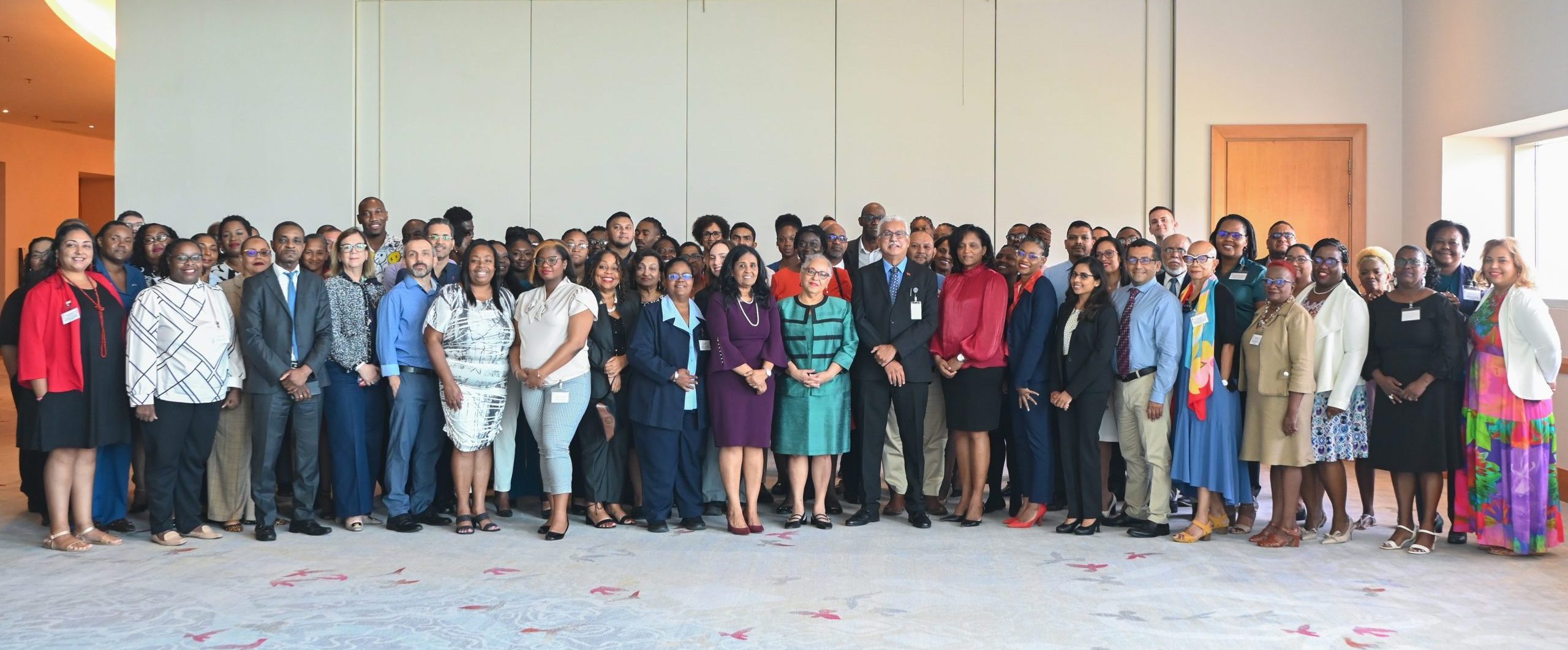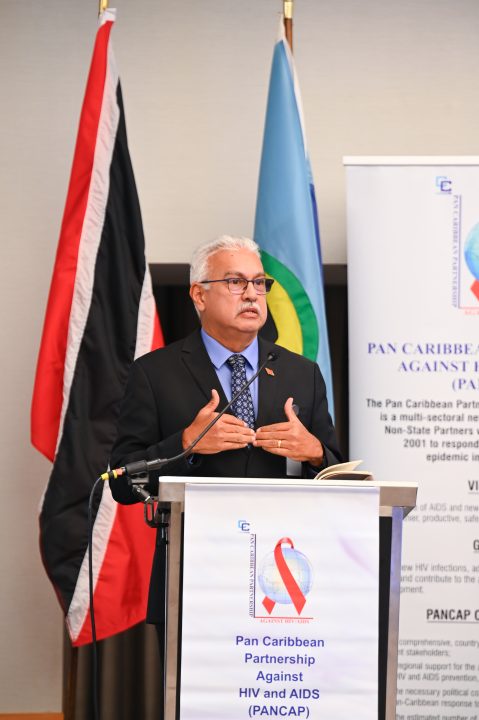
T&T Health Minister urges PANCAP to position Caribbean to be part of the push to develop a cure for HIV
Wednesday, 20 March 2024, (PANCAP Coordinating Unit, CARICOM Secretariat): The Pan Caribbean Partnership against HIV and AIDS (PANCAP), the mechanism that provides a structured and unified approach to the Caribbean’s response to the HIV epidemic, commenced its 8th meeting of National AIDS Programme (NAP) Managers and Key Partners on Tuesday, March 19, 2024, in the Republic of Trinidad and Tobago.
At the opening ceremony held at the Hyatt Regency Hotel, PCU Director, Dr Wendy Telgt Emanuelson, delivered welcoming remarks complementing the excellent work done within the region during the past few years as it relates to HIV and AIDS. The many significant achievements, she underscored, are not just numbers, but represent lives saved, families strengthened, and communities empowered.

Dr Ayanna Sebro, Representative of the Network of National AIDS Programme Managers, and Technical Advisor, National AIDS Commission, Republic of Trinidad and Tobago, in her remarks, addressed the need for decisive action to address some of the lingering challenges related to accessing HIV medications within the region. “As we contextualise the implementation of activities and regional access to sustainability, funding, monitoring resources, quality prevention treatment and care across the Caribbean network, we must be intentional in our efforts around procurement and timely access to supplies to remain up-to-date in terms of our access for essential supplies and to mitigate stock outs. We must actively pursue agreements to facilitate access to newer supplies for diseases of public health concern are especially important where patents create obstacles.”
Mr. Ivan Cruikshank, Executive Director of Caribbean Vulnerable Communities Coalition, in his comments, recognised the many achievements made within the region as it relates to HIV; central to which he mentioned the role of Civil Society Organisations (CSOs). However, he lamented the shrinking presence of CSOs since COVID-19. “We have to find ways of getting communities and civil society to be much more engaged in the treatment and care side of the pillars. Since COVID-19, there has been a decline in the presence and activism of civil society across the regional response,” Cruikshank said. “This meeting has to be a clarion call to governments to ensure that civil society remains vibrant and has sustainable resources to be able to support national programmes to deliver on these prevention targets.”
He further highlighted that “There are several opportunities presented across the region over these past few years to explore social contracting and to use social contracting or whatever variation of that modality we want to use to ensure that civil society continues to have a presence in our national response and support national programme managers.”
The Assistant Secretary-General from the Directorate of Human and Social Development CARICOM Secretariat, Ms Alison Drayton, recognised the commendable progress achieved in HIV prevention and treatment throughout the region but observed that many challenges endure. She urged that innovative initiatives to address those challenges commence with alacrity. “The UNAIDS 2022 Global AIDS Update furnishes us with a comprehensive snapshot of the HIV landscape in the Caribbean. The region has committed to ambitious targets, aiming for 95-95-95 by 2025 and the end of AIDS by 2030. As of 2022, we stand at 83% awareness, 68% on antiretroviral therapy, and 57% virally suppressed. To bridge this gap, we must expedite the adoption of innovative, evidence-based interventions such as pre-exposure prophylaxis (PrEP) and HIV self-testing.”
Delivering the feature address was the Minister of Health of the Republic of Trinidad and Tobago, the Honourable, Mr Terrence Deyalsingh, who charged participants to look towards the future for a cure for HIV, particularly through gene editing. “If we want to hit 95-95-95 by 2025 we need to think exponentially. We need to think of geometric progression, not linear progression,” the Minister said.
In referencing a study from North Western University titled “CRISPR and HIV: New technique in human blood unveils potential paths toward cure – Key to possible HIV cure may lie in mechanisms behind how it replicates,” the Health Minister believes that the Caribbean should strategically position itself towards contributing to a cure for HIV.
“I think it is time for us to look as a region to join with one of those research universities so that we are in the door. In so doing, we would have contributed toward finding a cure, so that when that cure comes we would have access to it. I am challenging PANCAP to find a way to get on to the bandwagon of CRISPR gene editing to find a cure so that when that cure is found we can say that PANCAP was there; that we had skin in the game.”
CRISPR is an acronym for Clustered Regularly Interspaced Short Palindromic Repeats and is a technology that research scientists use to selectively modify the DNA of living organisms.
Over the two days, regional technical partners shared their areas of support, aligned to the Caribbean Regional Strategic Framework 2019-2025 and the global HIV targets. This meeting concluded on Wednesday, March 20, 2024.
WHAT IS PANCAP?
PANCAP is a Caribbean regional partnership of governments, regional civil society organisations, regional institutions and organisations, bilateral and multilateral agencies and contributing donor partners established on 14 February 2001. PANCAP provides a structured and unified approach to the Caribbean’s response to the HIV epidemic, and coordinates the response through the Caribbean Regional Strategic Framework on HIV and AIDS to maximise efficient use of resources and increase impact, mobilise resources and build the capacity of partners.
What are the Global AIDS Strategy 2021–2026 targets and commitments?
If targets and commitments in the strategy are achieved:
- The number of people who newly acquire HIV will decrease from 1.7 million in 2019 to less than 370 000 by 2025
- The number of people dying from AIDS-related illnesses will decrease from 690 000 in 2019 to less than 250 000 in 2025.
- The goal of eliminating new HIV infections among children will see the number of new HIV infections drop from 150,000 in 2019 to less than 22,000 in 2025.
What are the 95-95-95 Targets for ending AIDS?
- 95% of People Living with HIV know their HIV status;
- 95% of people who know their status on treatment; and
- 95% of people on treatment with suppressed viral loads.
HELPFUL LINKS:
Global AIDS Strategy 2021–2026, End Inequalities, End AIDS
https://pancap.org/pancap-documents/global-aids-strategy-2021-2026-end-inequalities-end-aids/
Caribbean Regional Strategic Framework on HIV and AIDS (CRSF) 2019-2025
https://pancap.org/pancap-documents/caribbean-regional-strategic-framework-2019-2025/
